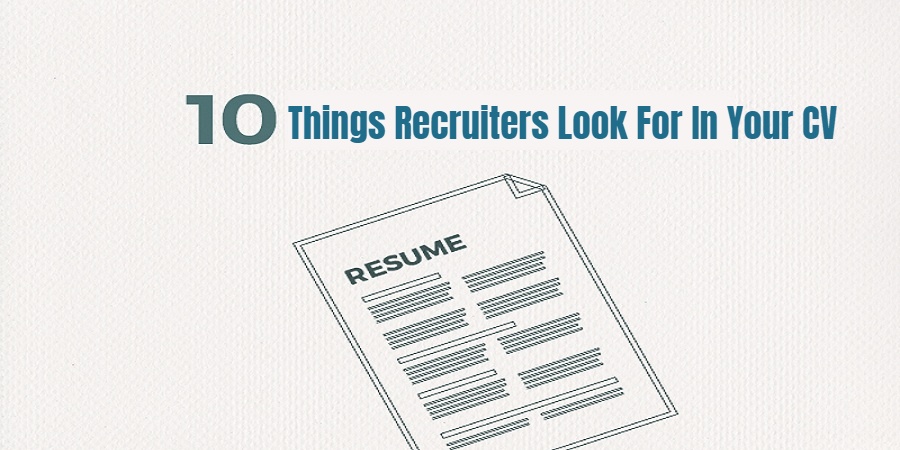
The CV (short for Curriculum Vitæ, which means the course of life in Latin) is probably the single most important document in the job search of any candidate. It is a detailed and chronological outline of your educational, professional and some bits of your personal journey so far, including but not limited to your education, internships, work experience, extra-curricular activities, volunteering experiences and any positions of leadership that you’ve held.
In today’s day and age of the job-search, where most white-collar job postings and recruitment as a whole have moved online, the CV is basically the digital representation of your self to companies and recruiters. It establishes the first impression in the eyes of recruiters, and as they say, you only get one chance to make a good first impression.
In light of this, it is imperative that you put your best foot forward when making and sharing CVs in your search for the right job.
Here are 10 things recruiters like/dislike and look for in your CV:
1. Language and grammar
Let me just put it straight. You CANNOT make any language or grammatical errors in your CV. Plain and simple. No matter what your academic or professional achievements are, spelling mistakes or grammatical errors put you on the back foot right from the word go. It shows to the recruiter that you are not careful or diligent enough to avoid such mistakes in your CV or even worse, that you don’t even know what the right spelling/syntax is.
Proof-read your CV as many times as possible and get it vetted by your friends and family to ensure that no error slips through the cracks.
Related: Career objective or resume objective samples
2. CV formatting
Obviously, you would want your CV to catch the recruiters’ attention. So it may be a good idea to refer to some CV templates online to help with the design of your CV.
However, regardless of the template or design being used, it is imperative that a couple of points are kept in mind – firstly it is extremely important to have your details in a chronological manner, with the latest employment or educational detail coming first followed by the preceding one and so on. Another point is to clearly outline dates, especially of your employment history (at least month and year). This gives the recruiter and the interviewer a better understanding of your total work experience.
3. Length of the CV
Your CV should ideally be between 1 – 2 pages long. Try and include all relevant highlights, especially your roles and responsibilities in all your jobs/roles. Also, include any special projects and/or rewards and recognition in your jobs. However, try and avoid being too verbose especially if your CV is becoming too long.
For candidates with 10+ years of experience, who’ve changed more than 5 or 6 jobs, it may sometimes be a good idea to leave out your first 1 or 2 roles, which may not be entirely relevant to your current or future job search.
4. Educational details
List out your educational details, either before or after the section with your work experience, in a chronological manner. Mention your institution, university (if applicable), degrees/specializations and marks obtained in each of them.
The best CVs point out how your educational qualifications and subjects are relevant to your current role and/or the role you’re applying for.
5. Extracurricular activities/positions of responsibility
Mention your extracurricular activities where you received any awards and any roles of responsibility that you held there. Any achievements in sports, music, case studies, quizzes, live projects etc. go here.
This section is especially useful for freshers appearing for campus placements or for candidates with 1 or 2 years of experience as a decent amount of importance is given to these areas to assess future potential and readiness.
6. Internships
Again, for freshers and candidates with 1 or 2 years of experience, it is important to mention internship experience(s), if any.
Recruiters and interviewers keenly look at the work done in the internships to gauge not just job readiness and fitment, but also as an indicator of how hardworking and outgoing the candidate is.
Of course, any PPOs (Pre-Placement Offers) go here and do your candidature no harm.
7. Company
In my experience, one thing that most candidates often fail to understand is the importance and relevance of the companies that they have worked for with the company or the job role they are applying for.
Even though a person may have done similar work in one company, his candidature may not make it through because of specific companies and/or domains that they have worked in.
For example, a sales manager in an FMCG company may find his candidature being rejected by companies in the technology and internet sector. Point being, sometimes it’s not just about personal competence that becomes the selection or rejection criteria, but also the companies and the domains they are present in. This may be due to similarities or differences in company philosophies, sizes, clients/customers, work cultures etc.
A candidate can always deep-dive and learn more about a company by reading company reviews.
8. Specific skills and competencies
A lot of jobs or roles require the candidate to have some specific skills or competencies that are relevant to the role. Sometimes, these may not be explicitly mentioned in the Job Description but may act as filtering criteria. Hence, a candidate’s CV may be rejected by the recruiter if he/she does not possess the specific skills/competencies.
For example, even though the job listing may be for that of a data scientist, the recruiter may be looking for someone with a basic hang of coding in Java along with being proficient in Data Science.
Related: Resume keywords: List of 21 relevant power words
9. Location preferences
Very often, a candidate may be based out of a different location than the one he/she completed their schooling or college from. The recruiter may look at this as an indicator of location preference and may reach out (or not reach out to) the candidate basis this information.
For instance, a candidate may currently be based out of Mumbai for the past few years but has completed her schooling from Noida. This might be a good indicator that even though she is living in Mumbai, she may be open to relocating to Noida if given the opportunity.
Some candidates choose to directly mention their location preferences in their CVs and the recruiters reach out to them for roles accordingly.
10. Gaps in employment or education
Finally, recruiters tend to scrutinize any gaps in employment closely. They definitely tend to inquire the reasons for such career breaks – be it for a sabbatical, education, personal family reasons or even for entrepreneurial stints. Longer gaps may be subject to closer scrutiny, so it is imperative that the candidate has solid and valid reasons for those gaps. Read More…
- HDFC Future Bankers Recruitment 2024 Latest Private Job Opportunities - 15/04/2024
- The Benefits of Working in Government Legal Jobs - 24/02/2024
- Top Highest Paying Bank Jobs in Hyderabad - 22/02/2024



